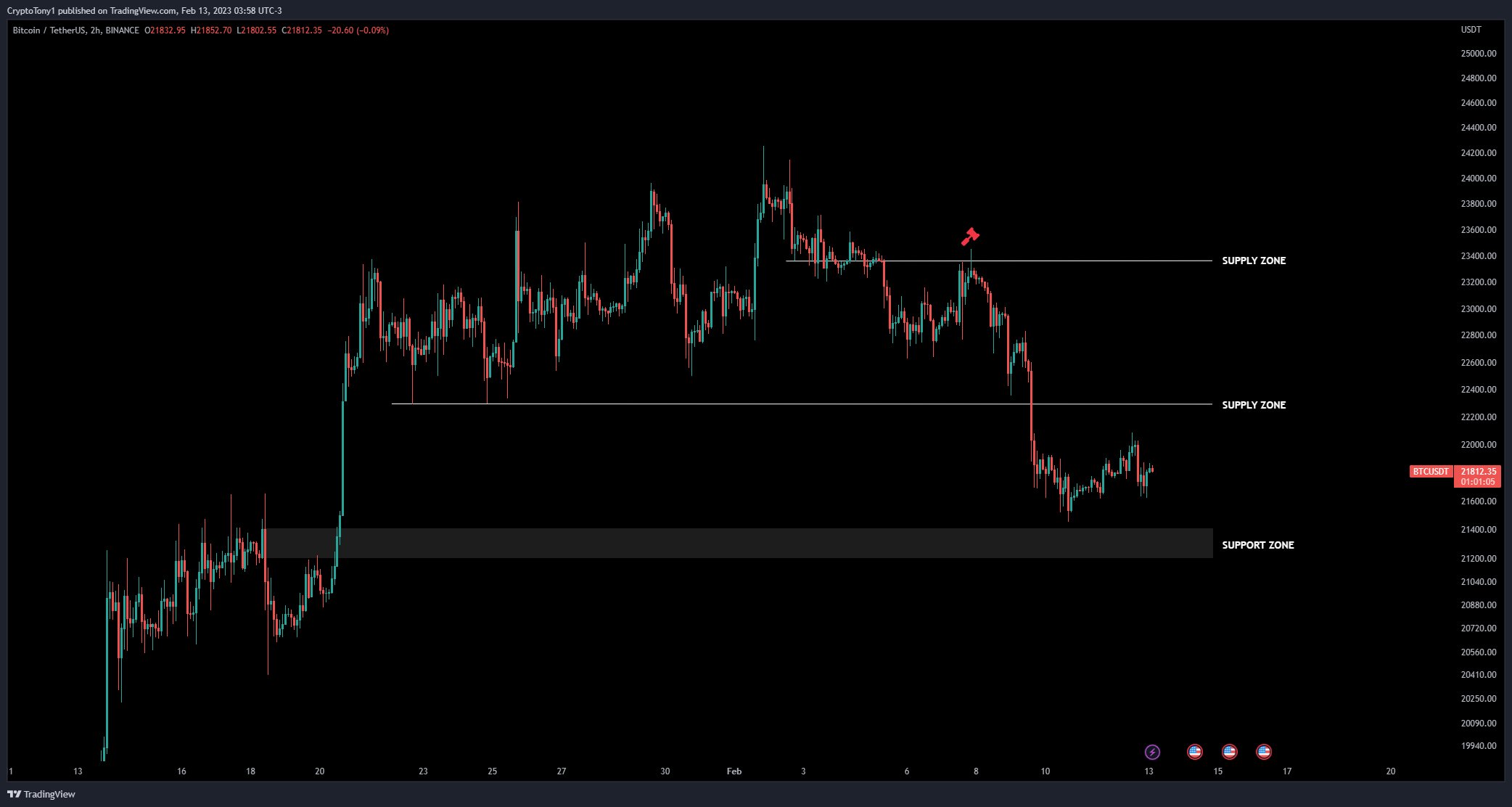Bitcoin (BTC) starts a new week just under $22,000 as bulls fail to reclaim lost ground in February.
After some modest volatility towards the weekly close, BTC/USD is still near three-week lows as a new status quo enters with $22,000 as resistance.
The largest cryptocurrency stands at the beginning of an important week of macroeconomic data, however, with plenty of opportunities for volatility to return.
These come first and foremost in the form of the U.S. Consumer Price Index (CPI), the January print for which will be released on Feb. 14.
Other data prints will follow throughout the week, and analysts are keenly eyeing crypto markets’ response, along with that of the U.S. dollar.
Within Bitcoin circles, whales are taking the opportunity to buy at current levels, data shows, in a glimmer of hope for those hoping that the 2023 Bitcoin price recovery may continue.
At the same time, a formidable new chart event is causing discomfort for some — can Bitcoin avoid significant downside as its first ever weekly “death cross” confirms?
Cointelegraph takes a look at these issues and more in the weekly digest of potential Bitcoin market triggers for the week ahead.
Bitcoin confirms weekly chart “breakdown”
At around $21,800, the latest weekly close had few surprises in store for those on either side of the Bitcoin trade, data from Cointelegraph Markets Pro and TradingView shows.
Its lowest since mid-January, the event sealed a long-awaited retracement for BTC/USD after it spent January experiencing practically unchecked upside.
Now, attention is focusing on key support levels holding, these mostly in the form of long-term trend lines reclaimed as support during the January run-up.
In a fresh update for Twitter followers on Feb. 13, popular trader Crypto Tony confirmed that $21,400 was where the situation may get interesting.
“From there we can really assess whether the bulls have it in them to save the bears, or lead them to slaughter,” part of commentary read.

Zooming in, fellow account Daan Crypto Trades noted that BTC/USD sat between the 200-period and 400-period exponential moving average (EMA) on 4-hour timeframes.
“It looks like we will open up with a small gap below us as we speak. Overall just a choppy weekend for BTC with some alts popping. Waiting for CPI. Probably won’t make many actions before that,” he summarized.

A more formidable line in the sand meanwhile comes in the form the 200-day MA. While still at $20,000, the level now constitutes an important one to hold for bulls to remain in control.
Sunday Night Musings
Shared earlier in the BTC Report but key points:
– Weekly OB
– Jan high taken
– HTF FVG’s drawing price
– 200MA lining up with prior consolidation
– Let’s see how market sentiment opens
– Plans for both but favouring the pull backHappy Sunday pic.twitter.com/AkTqqarX8a
— B C Richfield (@BC_Richfield) February 12, 2023
On weekly timeframes, the picture is no better, trader and analyst Rekt Capital warns. Flagging $21,839 as the point of interest, he said that a weekly close below this would “confirm the breakdown” in BTC/USD, a move which ultimately came true.
That same level had acted as resistance several times since the middle of last year.

“Most important” CPI print arrives
The macro landscape is set to be dominated by one data point in particular this week with the Feb. 14 release of the U.S. Consumer Price Index (CPI) for January.
Bets are on for inflation continuing to decline in a move which could still buoy risk assets despite a comedown in early February.
The picture is complicated by a reshuffling of how CPI is calculated, but analysts dispute its significance versus the overall trend of inflation receding.
Regardless of that, however, this month’s print is being closely eyed far beyond crypto circles.
“Tuesday’s CPI report is the most important report to date. After a strong January jobs report and December CPI ‘revised’ higher, uncertainty is everywhere,” capital markets newsletter, The Kobeissi Letter, told Twitter followers at the weekend.
“Both bulls and bears need the report to go their way. Whichever side is right will drive the market for the next month.”
Popular trader and analyst Myles G meanwhile underscored the consequences for crypto should CPI come in higher than expected, warning that this would “dump the market big.”
“Almost every CPI reveal last 6 months has been an instant dump, then an immediate recovery after traders digested the data,” fellow trader Satoshi Flipper noted about the relationship between CPI and market volatility.
“Will this time be different?”

The extent to which CPI plays a role in policy adjustments at the Federal Reserve is also a topic of debate at present, after Chair Jerome Powell suggested that another metric may be the “most important” tool for inflation monitoring late last year.
With the next decision on interest rates due only in the third week of March, however, policymakers will have the February CPI numbers to hand should January prove an unexpected anomaly.
First-ever weekly “death cross” sparks concern
Bitcoin is caught between two “crosses” this month in a curious scenario, which is dividing opinion when it comes to its significance.
As Cointelegraph reported, a “golden cross” on daily timeframes is combining with a “death cross” on the weekly chart.
The latter is the first of its kind for BTC/USD, but death crosses on other timeframes have often preceded significant price downside.

Whether the daily golden cross will repeat historical patterns and buoy the market remains to be seen, but in the meantime, another brand new cross is taking place.
As noted by Caleb Franzen, senior market analyst at Cubic Analytics, Bitcoin’s 1-year exponential moving average (EMA) is about to drop below its 3-year counterpart for the first time ever.
“This crossover has never happened before, highlighting the severity of the BTC bear market,” he wrote in part of Twitter commentary on Feb. 11.
The event in fact occurred in mid-December, but the 1-year EMA has since continued to decline, plunging ever further below the 3-year and 2-year EMAs.
In accompanying analysis, Franzen argued that the crossover could reframe Bitcoin bear market behavior. This time around, the depression could be harder and more drawn out than before.
“While many Bitcoin investors have noted that BTC typically bottoms roughly ~400 days after the bull market peak, this chart suggests that this time is different,” he wrote.
“Considering that we’ve never seen this signal until now, the implication is that the 1-year trend might stay below the 3-year trend even longer!”
He continued that the 2-year EMA may also end up crossing below the 3-year EMA, which would likewise constitute a first-of-its-kind event.
“Personally, I wouldn’t be surprised if that occurs within the next 6 months as a result of further sideways action or downward consolidation,” the analysis forecast.

Whales stay engaged
When it comes to interest in Bitcoin at current prices, whales may have already broken the silence.
In data released on Feb. 13, research firm Santiment noted that whales had stepped up transaction activity as BTC/USD dipped to $21,600 around the weekly close.
“Bitcoin dipped down to $21.6k on Sunday, and whale addresses responded by transacting at their highest rate in 3 months,” it summarized.
Santiment community contributor sanr_king called the whale moves “significant.”

A snapshot of order book activity at Binance meanwhile showed the presence of a major whale entity on Feb. 12, along with a new sell wall at just above $22,000 into the weekly close.
On-chain analytics resource Material Indicators, which uploaded the data, noted it “shows new ask liquidity coincides with resistance at the 21-Day Moving Average and the .618 Fib.”
“Regardless of how high BTC bulls can push before the W close/open, expecting the Death Cross to have an adverse impact on short term upward momentum,” it commented, referencing the aforementioned weekly chart occurrence.

Hodlers bounce back to health
Regardless of what the whales choose to do, the average hodler has yet to take profit, data shows.
Related: Bitcoin is already in its ‘next bull market cycle’ — Pantera Capital
According to on-chain analytics firm Glassnode, long-term holders (LTHs) have been busy accumulating new positions over the past month, in particular.
Its Hodler Net Position Change metric hit three-month highs on Feb. 13, marking a return to hodling behavior not seen since the FTX debacle hit.

For those LTHs opting to cash out some of their coins, conditions are also improving. In the previous edition of its weekly newsletter, “The Week On-Chain,” Glassnode described profitability “recovering” in 2023.
It referenced the Spent Output Profit Ratio (SOPR) metric, which measures the relative proportion of in-profit coins appearing in transactions.
“Assessing the Long-Term Holder cohort, we can observe a persistent regime of sustained losses since the LUNA collapse,” it wrote.
“Despite this cohort continuing to take losses over the last 9 months, there are initial signs of a recovery, with a potential uptrend in LTH-SOPR starting to form.”

The views, thoughts and opinions expressed here are the authors’ alone and do not necessarily reflect or represent the views and opinions of Cointelegraph.




